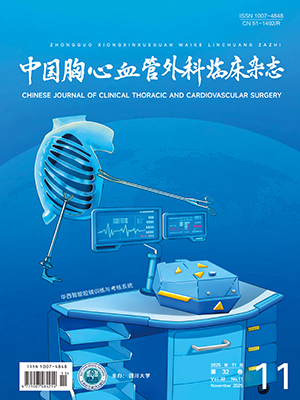| 1. |
Kristensen SD, Laut KG, Fajadet J, et al. Reperfusion therapy for ST elevation acute myocardial infarction 2010/2011: current status in 37 ESC countries. Eur Heart J, 2014, 35(29): 1957-1970.
|
| 2. |
Pedersen F, Butrymovich V, Kelbæk H, et al. Short- and long-term cause of death in patients treated with primary PCI for STEMI. J Am Coll Cardiol, 2014, 64(20): 2101-2108.
|
| 3. |
Ibanez B, James S, Agewall S, et al. 2017 ESC guidelines for the management of acute myocardial infarction in patients presenting with ST-segment elevation: The task force for the management of acute myocardial infarction in patients presenting with ST-segment elevation of the European Society of Cardiology (ESC). Eur Heart J, 2018, 39(2): 119-177.
|
| 4. |
Benjamin EJ, Muntner P, Alonso A, et al. Heart disease and stroke statistics-2019 update: A report from the American Heart Association. Circulation, 2019, 139(10): e56-e528.
|
| 5. |
Widera C, Pencina MJ, Meisner A, et al. Adjustment of the GRACE score by growth differentiation factor 15 enables a more accurate appreciation of risk in non-ST-elevation acute coronary syndrome. Eur Heart J, 2012, 33(9): 1095-1104.
|
| 6. |
Zhang S, Wan Z, Zhang Y, et al. Neutrophil count improves the GRACE risk score prediction of clinical outcomes in patients with ST-elevation myocardial infarction. Atherosclerosis, 2015, 241(2): 723-728.
|
| 7. |
Fordjour PA, Wang Y, Shi Y, et al. Possible mechanisms of C-reactive protein mediated acute myocardial infarction. Eur J Pharmacol, 2015, 760: 72-80.
|
| 8. |
Wada H, Dohi T, Miyauchi K, et al. Independent and combined effects of serum albumin and C-reactive protein on long-term outcomes of patients undergoing percutaneous coronary intervention. Circ J, 2017, 81(9): 1293-1300.
|
| 9. |
Chien SC, Chen CY, Lin CF, et al. Critical appraisal of the role of serum albumin in cardiovascular disease. Biomark Res, 2017, 5: 31.
|
| 10. |
中华医学会心血管病学分会中华心血管病杂志编辑委员会. 急性 ST 段抬高型心肌梗死诊断和治疗指南. 中华心血管病杂志, 2015, 43(5): 380-393.
|
| 11. |
Polterauer S, Grimm C, Seebacher V, et al. The inflammation-based Glasgow prognostic score predicts survival in patients with cervical cancer. Int J Gynecol Cancer, 2010, 20(6): 1052-1057.
|
| 12. |
Iwasaki Y, Ishizuka M, Takagi K, et al. A high preoperative Glasgow prognostic score predicts a high likelihood of conversion from laparoscopic to open surgery in patients with colon cancer. Surg Endosc, 2019, 33(4): 1111-1116.
|
| 13. |
Hao X, Wei Y, Wei X, et al. Glasgow prognostic score is superior to other inflammation-based scores in predicting survival of diffuse large B-cell lymphoma. Oncotarget, 2017, 8(44): 76740-76748.
|
| 14. |
Yotsukura M, Ohtsuka T, Kaseda K, et al. Value of the Glasgow prognostic score as a prognostic factor in resectable non-small cell lung cancer. J Thorac Oncol, 2016, 11(8): 1311-1318.
|
| 15. |
Saito I, Maruyama K, Eguchi E. C-reactive protein and cardiovascular disease in East Asians: a systematic review. Clin Med Insights Cardiol, 2015, 8(Suppl 3): 35-42.
|
| 16. |
Berg IJ, Semb AG, van der Heijde D, et al. CRP and ASDAS are associated with future elevated arterial stiffness, a risk marker of cardiovascular disease, in patients with ankylosing spondylitis: results after 5-year follow-up. Ann Rheum Dis, 2015, 74(8): 1562-1566.
|
| 17. |
Wang CH, Li SH, Weisel RD, et al. C-reactive protein upregulates angiotensin type 1 receptors in vascular smooth muscle. Circulation, 2003, 107(13): 1783-1790.
|
| 18. |
Kosmas CE, Silverio D, Sourlas A, et al. Anti-inflammatory therapy for cardiovascular disease. Ann Transl Med, 2019, 7(7): 147.
|
| 19. |
Arques S. Human serum albumin in cardiovascular diseases. Eur J Intern Med, 2018, 52: 8-12.
|




